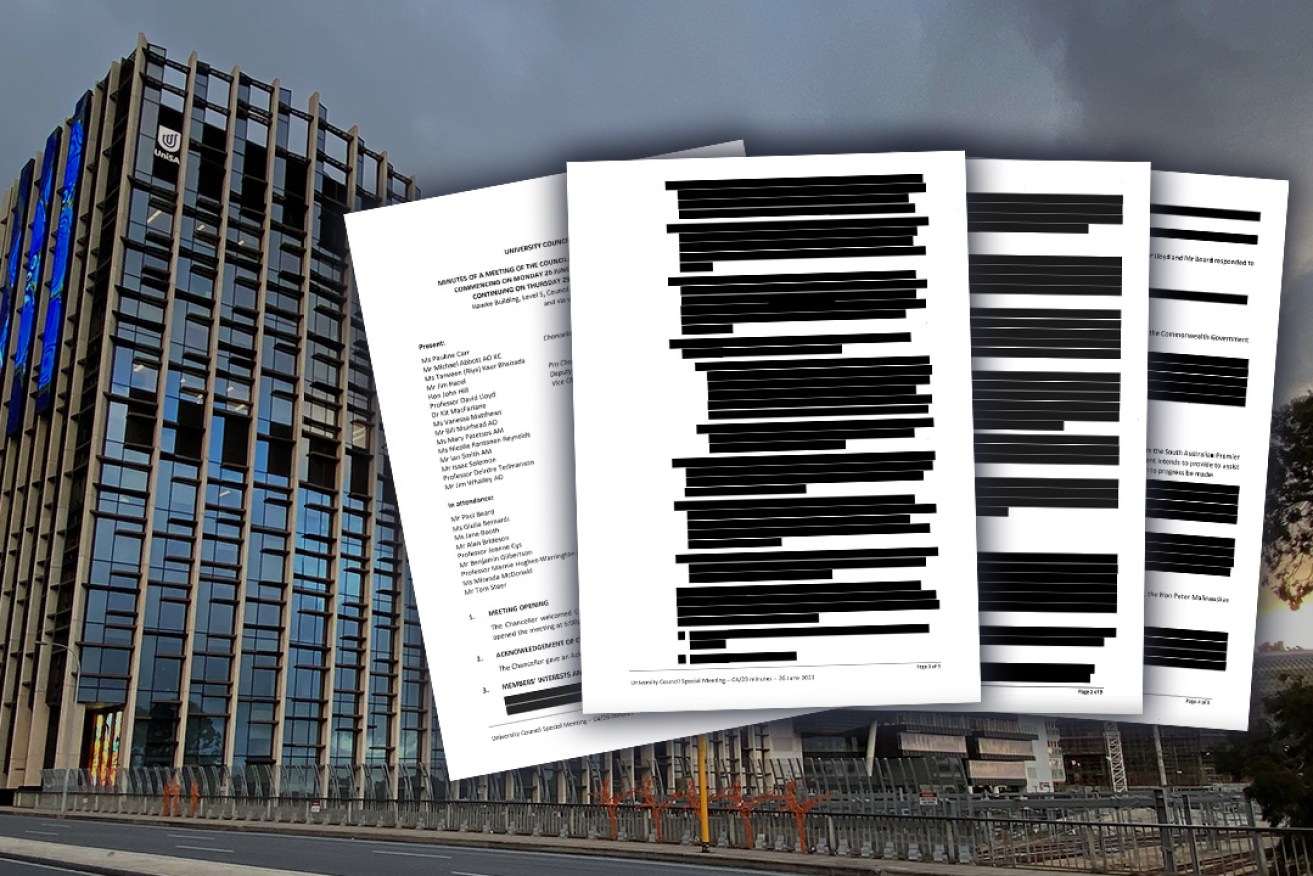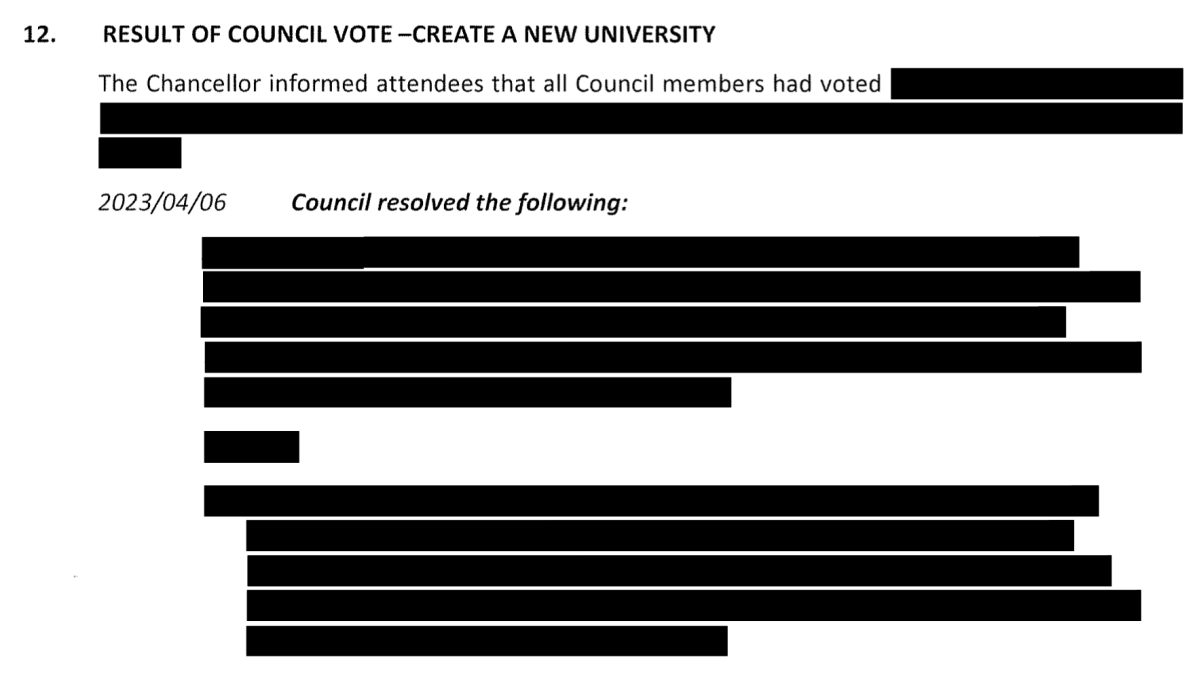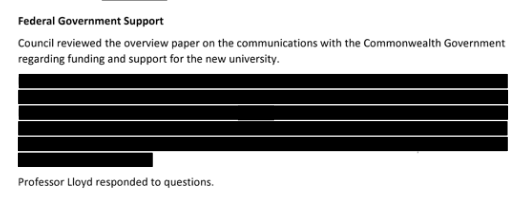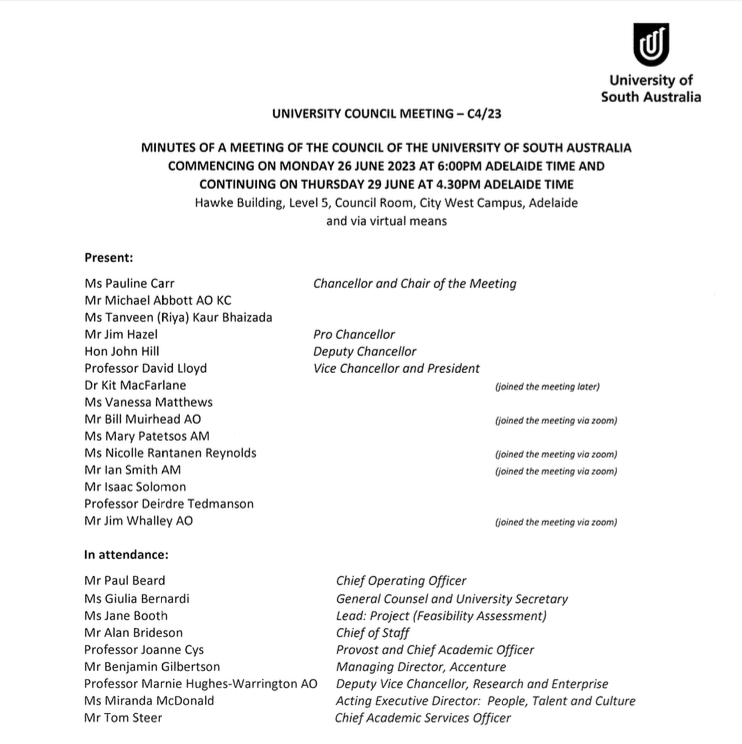REDACTED: UniSA blocks release of merger details
UniSA has refused access to almost all details about the council meeting where it agreed to support a merger with the University of Adelaide, claiming the release of this information could “potentially cause confusion and unnecessary concern”.


UniSA is refusing to release large sections of the minutes of the council meeting where it agreed to support a merger. Of 13 agenda items listed, only three – the meeting opening, acknowledgement of country and meeting closure – are unredacted.
InDaily filed a freedom of information (FOI) request last month asking for the minutes of the June meeting where UniSA’s governing council voted to support the Malinauskas Government’s push to create a newly merged university.
In response, UniSA on Monday released a heavily redacted nine-page document containing minutes of a council meeting held on Monday, June 26 from 6pm to 8.38pm.
Of the 13 agenda items in the minutes, only three – the meeting opening, acknowledgement of country and meeting closure – are unredacted.
The following agenda items were completely, or nearly completely, blocked out:
- Members’ interests and declarations of conflicts.
- Consideration of the feasibility assessment, business case and financial plan, federal and state government support, legal and legislative support, transition plan and draft heads of agreement.
- Supporting documentation.
- Proposed Memorandum of Understanding.
- Result of the council vote – create a new university.
One agenda item has its title redacted so it’s unclear what was discussed. A full copy of the document released can be found below.

Loading…
One of the arguments made by the university’s FOI officer as to why the minutes should not be released in full was that disclosure would “potentially cause confusion and unnecessary concern regarding issues discussed in the course of the proposed merger”.
All members of the UniSA council were present for the June 26 meeting, the minutes state, and a vote to “create a new university” was held using the confidential electronic voting system, Big Pulse.
Voting opened when the meeting adjourned at 8.38pm on Monday and was open until 4pm on Thursday, June 29.
The meeting was reconvened at 4.30pm on Thursday to announce the results of the vote. UniSA then informed staff at 8.02pm on Saturday, July 1 that the merger with Adelaide would be progressing.
The results of the council vote, and the 18 paragraphs detailing what the council voted on, have been fully redacted by UniSA in their FOI release.
In its determination, UniSA cited FOI exemptions applying to documents affecting business affairs, documents subject to legal professional privilege, internal working documents and documents containing confidential material.
It also cited exemptions to documents affecting financial and property interests and concerning operations of agencies.

The result of UniSA council vote to create a new university. All 18 paragraphs of the motion were redacted by UniSA.
Alan Brideson, chief of staff to UniSA vice-chancellor David Lloyd, argued the minutes contain information of “commercial value” that, if released, would “prejudice the interests of the University and the value of that information”.
He also said the minutes contain “recommendations and/or opinions” about the proposed merger which helped UniSA come to its decision that, if released, “may inhibit the University’s ability to obtain opinions or recommendations in the future”.
“Overall, the disclosure of the abovementioned information would diminish the value of the information, would have an adverse effect on the University’s ability to conduct business and prejudice the University’s commercial interests by allowing competitors (such as other universities and education providers) to become aware of the University’s proprietary and commercially sensitive information,” Brideson wrote.
Brideson, who is an accredited FOI officer, further argued that redacting the majority of the council minutes satisfied the public interest test because releasing the information would “on balance, be contrary to the public interest”.
He said releasing the minutes in full could disclose matters “imparted in confidential circumstances where there was a reasonable expectation that those matters would remain confidential” and could “inhibit frankness and candour in future communications and decision-making”.
“(Releasing the document would) disclose the strategic thinking and planning of the University, the release of which would severely compromise the University’s negotiating position and commercial interests in the future,” Brideson wrote.
“(It would also) prejudice the ability of the University to compete effectively in a highly competitive market; and potentially cause confusion and unnecessary concern regarding issues discussed in the course of the proposed merger, particularly when those issues are still the subject of consideration and discussion or when they are viewed out of context.”
InDaily is applying for an internal review of the decision.
Federal funding support discussed for uni merger
One of the few revelations contained within the released minutes is that there have been talks between the federal government and the universities over Commonwealth funding support for the new Adelaide University.
Currently, the only external financial support publicly disclosed is a $444.5m state government support package made up of perpetual funds, land acquisitions and international student measures.
Under a section titled “Federal Government Support”, the minutes state that the UniSA council “reviewed the overview paper on the communications with the Commonwealth Government regarding funding and support for the new university”.
Vice-chancellor Lloyd took questions on the matter. The rest of the section is redacted.

The section of the June 26 meeting where UniSA’s council discussed federal government funding support for the merger.
Premier Peter Malinauskas also wrote a “letter of intent” to the two universities on June 14, 2023 – two weeks before the merger was agreed – to outline the “suite of support measures” the state government would provide for the new university.
Details about the letter are redacted in the minutes. The Premier’s Office has also declined to release that letter in a separate FOI request lodged by InDaily.
Consulting firm involvement revealed
InDaily can reveal that global consulting firm Accenture was involved in the development of UniSA’s feasibility assessment for the merger, after the firm’s Melbourne-based managing director, Ben Gilbertson, was listed as an attendee at the June 26 governing council meeting.
Following questions from InDaily about the FOI document, a UniSA spokesperson said: “To augment our internal capabilities UniSA engaged Accenture to assist in undertaking the feasibility study on the potential creation of the new University.
“Accenture representatives have attended some UniSA Council meetings connected with information they have assisted in preparing.”
Accenture has an existing partnership with UniSA through an “Innovation Academy” where students can take a bachelor of digital business degree co-designed by Accenture and UniSA.
InDaily asked UniSA whether it contemplated if this existing partnership could raise a conflict of interest. In response, a spokesperson said: “UniSA has rigorous procurement processes that consider risks and any potential, actual or perceived conflicts of interest.
“The University has worked with a number of consultants and external partners in developing its industry focussed programs and always considers potential conflicts of interests.”
Asked whether any other consulting firms were involved in developing the feasibility assessment, the spokesperson said: “UniSA has engaged a range of expert and specialist advisors to assist in undertaking the feasibility study on the potential creation of the new University.”
UniSA and the University of Adelaide have previously refused to reveal what consultants were used in developing the business case and feasibility assessments for its agreed merger.
Gilbertson is the only consulting firm director listed as “in attendance” for the meeting.
Accenture declined to comment on Monday when asked whether they were involved in developing the business case or feasibility assessment for the merger, referring questions back to the university.
After UniSA confirmed Accenture’s involvement, an Accenture spokesperson responded to questions about whether a conflict of interest was considered.
“At Accenture we take conflicts of interest very seriously and adhere to strict procurement and new business processes which are designed to identify and manage potential conflicts of interests,” the spokesperson said.
“We also comply with any procurement requirements of our current and potential clients, including the disclosure of any actual or perceived conflicts.”
While Accenture helped develop the feasibility assessment, Jane Booth, UniSA’s chief people and culture officer, is listed as the project lead for the feasibility assessment.

The meeting attendance register contained within the minutes of the council meeting.
UniSA vice-chancellor Lloyd and University of Adelaide vice-chancellor Peter Høj are due to appear before the parliamentary inquiry into the university merger this afternoon.
Premier Malinauskas told ABC Radio Adelaide earlier this year that the committee inquiry will receive “everything it’s entitled to” regarding information and documents about the merger.
“We don’t have a full-blown public inquiry to a whole range of matters that are subject to commercial in confidence,” he said on July 7.
“But everything, including as much information within feasibility studies, business cases – all of that will be furnished to the parliamentary inquiry subject to the commercial in confidence components, which I have asked the universities to keep to an absolute minimum.”




